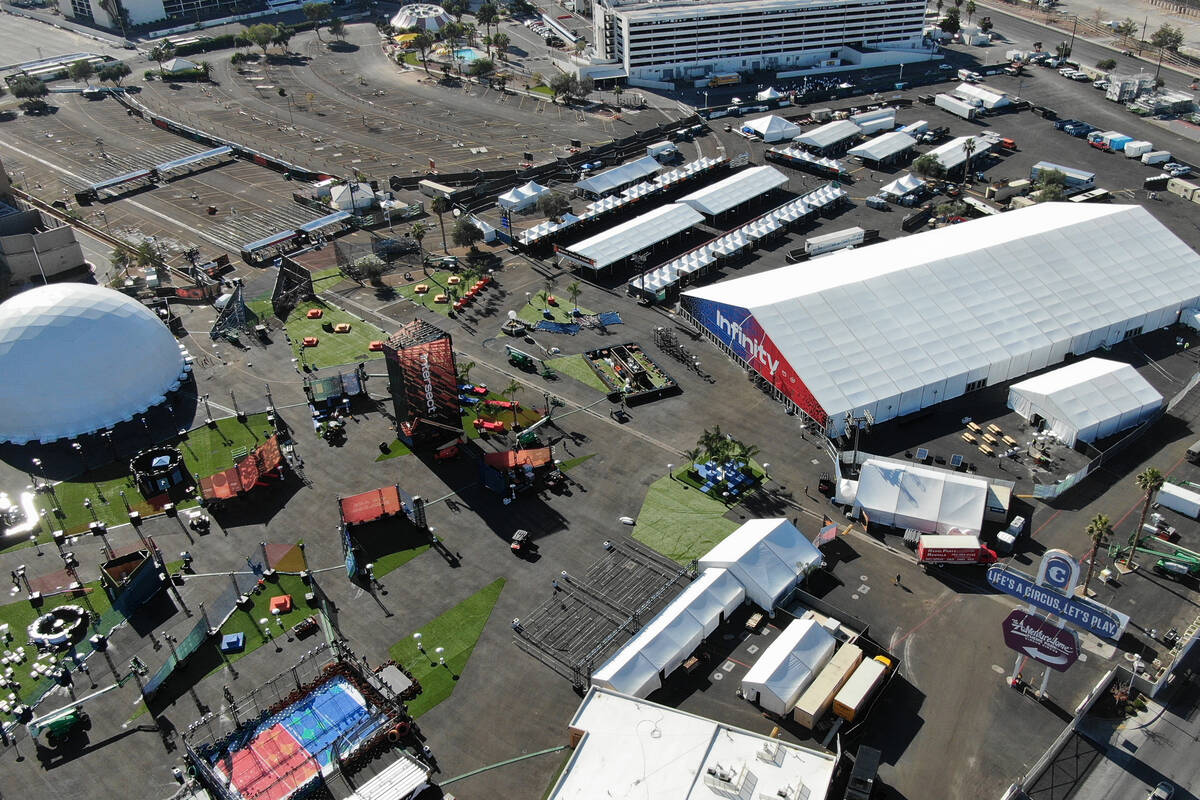A’s discussed having resorts cover potential tax shortfalls at Strip ballpark site

The Oakland Athletics’ negotiations for an alternative ballpark site in Southern Nevada included the possibility of having north Strip and downtown resort operators cover any shortfalls in tax revenue needed to finance construction of the stadium.
The condition would have been tied to a special tax district around the Las Vegas Festival Grounds, 39 acres on the southwest corner of Las Vegas Boulevard and Sahara Avenue owned by Phil Ruffin. The site was one of the final locations the A’s considered for a new ballpark before entering into a binding purchase agreement last week for the former Wild Wild West property at Tropicana Avenue and Dean Martin Drive.
“It was something we have discussed,” Resorts World President Scott Sibella said of the tax shortfall proposal in an email to the Las Vegas Review-Journal. “But not the reason the deal didn’t get done at the festival site.”
Las Vegas Convention and Visitors Authority President and CEO Steve Hill said resorts will not serve as a financial backstop for a stadium on the Wild Wild West site.
“It was a concept that we thought might work because of the specifics around the (festival grounds) site and the number of properties that were near it,” Hill said. “If that site had remained the primary site, it was an option that would have probably been pursued. There was interest in at least further discussion by the properties around there.”
Ruffin, who owns Circus Circus and Treasure Island on the Strip, wasn’t available for comment regarding the festival grounds negotiations.
The A’s declined to comment on negotiations regarding potential ballpark sites other than the former Wild Wild West location.
Under the festival grounds proposal, if taxes generated in the stadium district — including sales, live entertainment and property taxes — didn’t meet the amount needed to repay county bonds, the resorts in the stadium’s vicinity could have been relied upon to cover the difference.
North Strip and downtown resort operators had expressed public support for the festival grounds site, saying it would greatly benefit their businesses.
The tax district at the festival grounds would have been similar to the one the A’s are now working to secure at the former Wild Wild West property, just west of the Strip and owned by Red Rock Resorts. The A’s are asking for up to $500 million in public funding for a $1.5 billion ballpark with 30,000 to 35,000 seats and a partially retractable roof. The bill that would create the tax district and enable the Major League Baseball team’s relocation to Las Vegas has not yet been introduced at the Nevada Legislature.
Although the A’s now intend to buy the 49 acres at Tropicana and Dean Martin, Sibella said Resorts World is still in favor of the team relocating to Southern Nevada.
“Yes, we were disappointed because we know it’s the best site for the city of Las Vegas,” Sibella said of the Las Vegas Festival Grounds. “We’re happy that the A’s are coming and will support them, but not as much as we would have if it was the festival lot.”
Derek Stevens, who owns multiple downtown resorts, including Circa, also was part of meetings with the A’s and echoed Sibella’s sentiments.
“I’m a big supporter of the Oakland A’s coming to Las Vegas,” Stevens said in a statement. “This is an exciting time for the city as it continues to reinvent itself and expand its sports landscape.”
Hill said the north Strip and downtown resorts would have been on the hook for about $12 million annually under the festival grounds proposal. That amount would have guaranteed the revenue total needed to secure county bonds, Hill said.
The A’s also had an option to place their proposed Southern Nevada ballpark on excess land around the Rio, located on the north side of Flamingo Road, just west of Interstate 15 and the Strip. Dreamscape Companies, owner of the Rio, offered the A’s 22 acres for $1, but the A’s declined.
A source indicated that the A’s preferred the Wild Wild West site, despite the $1 offer, because of traffic and parking challenges the Rio site would have presented.
Hill noted that the A’s, early in their talks with the LVCVA, inquired about creating a new hotel room tax to help finance the stadium. The idea was quickly shot down, Hill said.
Contact Mick Akers at makers@reviewjournal.com or 702-387-2920. Follow @mickakers on Twitter.